
*
"All my relationships with women are very, very important to me," Tennessee Williams once said. "I understand women, and I can write about them."
Many playwrights are known for their towering male characters. A smaller number are extolled for their female creations. Ibsen has his Nora and Hedda. Shaw gave us Mrs. Warren, Major Barbara, Candida, Saint Joan and Eliza Doolittle. And Chekhov brought to life three sisters (not to mention a couple monstrous mothers). Among American writers, arguably no dramatist has more of a way with women than Tennessee Williams. As indelible as Stanley Kowalski, Big Daddy and Tom Wingfield may be, they would lose in a duel of personalities with Blanche DuBois, Maggie the Cat and Amanda Wingfield. Williams armed his ladies with all the style and wit he himself possessed, while also imbuing them with his knowledge of emotionalism, vulnerability and heartbreak. Novelist Gore Vidal, who rarely had a kind word to say about anyone, claimed, "there is no actress on earth who will not testify that Williams created the best women characters in the modern theatre."
Shirley Knight, an actress, and a renowned interpreter of Williams, does not dispute it. She believes Williams' female characters are so unforgettable that, "We receive our information about the South from 'Gone with Wind,' from Faulkner, but mostly from Tennessee Williams. When we think of Southern women, we think of Tennessee's women."
"Tennessee had an extraordinary understanding of women," said Emily Mann, who directed the recent Broadway staging of A Streetcar Names Desire. "It's rare to have a writer of such stature to have such a repertoire of amazing women." Playbill.com scanned that repertoire and named the five women who could stand out among their sisters. Read on.
| |
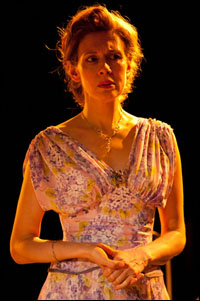 |
|
| Jessica Hecht as Blanche at the Williamstown Theatre Festival | ||
| Photo by T. Charles Erickson |
No female in the Williams cast of characters looms as large as Blanche DuBois. Nearly every lady the playwright created clings to illusions of untarnished reputation, a rosy future and the innate beauty of life, but none so tenaciously as Blanche, whose best years have long peeled away from her by the time she lands on the doorstep of her proletariat sister Stella and Stella's brutish husband Stanley. Battering her butterfly wings against age-disguising Chinese paper lanterns, she's broken by a world robbed of grace and gentility. "It's an incredible role," said Elizabeth Marvel, who played Blanche in Ivo van Hove's notorious 1999, avant garde interpretation of the play at New York Theatre Workshop. "It's hard to find a woman he wrote that isn't a fantasist. I think what's so striking for me about Blanche is it's so clear I needed to understand Tennessee to play the part. That was my research. I spent a lot of time reading his letters and such. He wrote himself into that role so totally, in a way that you don't find in other characters, like in The Glass Menagerie. There's that personal touch in it."
Shirley Knight — a noted Williams specialist (Williams wrote A Lovely Sunday for Creve Coeur for her) — played Blanche twice, once at the McCarter Theatre in Princeton, NJ, and once at the Annenberg Center in Philadelphia. "I felt it was a part I was born to play," she said, calling Blanche her favorite Williams role. "I think Blanche is his most poetic character, and, of course, his poetry is so remarkable. I did the role twice because I wasn't quite sure I had done my work on it. I loved her demeanor. And the humor." (Knight is currently starring in an Off-Broadway production of Williams' late-career play In Masks Outrageous and Austere at the Culture Project.)
| |
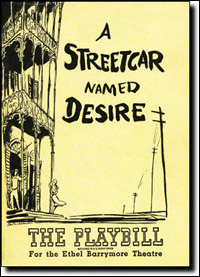 |
|
| Playbill cover from the original 1947 Broadway production. |
Hecht concurs. "They're deeply intelligent characters," she said. "They're not only steely, they're so resourceful in their desire to get out from under their circumstances. They're a product of a time when you couldn't get the life you wanted." "It's wonderful for one's ego to play someone who is so victimized," observed Marvel of Blanche, "but I don't think there's an ounce of victim in her. And that's the trap many actresses fall into. Blanche is a tenacious bastard, and an alcoholic, and a manipulator, and a lot of things to poke a stick at."
| |
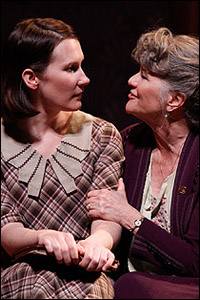 |
|
| Judith Ivey (right) with Keira Keeley in the Roundabout production of The Glass Menagerie. | ||
| Photo by Joan Marcus |
Amanda Wingfield, the manipulative but protective matriarch of the unfortunate, fractured St. Louis family in The Glass Menagerie, certainly didn't get the life she wanted. A one-time sought-after Southern belle, her traveling-salesman husband decamped, leaving her to fend for herself and her two children — the daydreaming Tom and the "crippled" Laura. Determined to pin a happy ending on her sorry circumstances, all the while keeping up appearances, she schemes and scrapes with a studied genteel smile. (Read about the new 2013 American Repertory Theater production starring Cherry Jones.)
The Texas-born Judith Ivey recently delivered an acclaimed interpretation of Amanda for the Roundabout Theatre Company in 2010. She remembered that, when she told people of her new assignment, they would say "you're going to play the beautiful monster."
"She's perceived that way when you don't look for all the depth, all the imagination," said Ivey. As with Blanche, the key to getting Amanda right is in the humor, in Ivey's estimation. "Williams is a classic now, so those characters can become stereotypes. I've seen a lot of Amandas, and the ones I liked showed her humor. Amanda loves her children; she doesn't hate them. It's not all narcissistic indulgence."
"I found Glass Menagerie terribly funny," said Knight, who played the part at the McCarter. "Tennessee felt that way. He said when people did it too serious, it didn't work." Mann, who has staged Menagerie twice (including the production that starred Knight), is inclined to judge the demanding Amanda less harshly than her son Tom, and some theatregoers, do. "Amanda is so darling as a mother," she said. "She flutters around her children and cares so deeply. Her mad need is to make things right — she's funny because of that."
Speaking more broadly about Williams' females, Hecht said, "Everybody has an opinion about what Williams is after and what these women represent. There's not one simple truth you're after; it's a deeply human character. There's not one way to play it. It's more a question of how we find abandonment. All these characters are driven to this point where they have no reins on their life."
| |
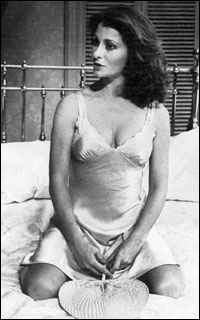 |
|
| Elizabeth Ashley as Maggie on Broadway in 1974. |
At first glance, the fiery Maggie would seem the strongest of all Williams heroines. She speaks her mind to her unresponsive husband Brick, tells off her hated in-laws, and twists her powerful father-in-law, Big Daddy, around her pretty finger. Moreover, she's in full knowledge and command of her ripe sexuality. Yet, in truth, Maggie controls nothing around her. She's losing her inheritance to her fertile sister-in-law, can't get her alcoholic spouse to sleep with her, and thus can't produce an offspring that would impress Big Daddy. More than Blanche and Amanda, success is within her reach. But her life is nonetheless pure frustration.
Elizabeth Ashley was the most famous Maggie of her generation — she played the role on Broadway to acclaim in 1974 — and knew where the character was coming from. "I had the advantage of growing up in a life pretty much exactly like Maggie's," she said. "I grew up speaking the language and experiencing that particular class system." Knowing the sound of Maggie, said Ashley, is critical to playing the part. "It's not just 'Southern.' More often than not, actors who don't have a Southern background or an extraordinary ear, deliver that all-too-common grotesque caricature or a Southern drawl. [Maggie's accent] is a sexual Gulf Coast cry/growl/moan."
She continued, "Tennessee's language is as exacting as Shakespeare's. It's onomatopoeic — it's meaning is in its rhythms, its sounds, its silences, its 'time.' Sometimes he writes in a syncopated jazz time and — quite often — the big soliloquies and monologues are written in waltz time."
| |
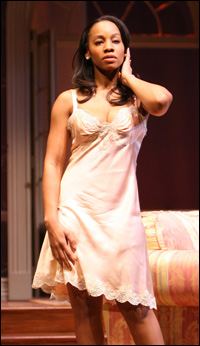 |
|
| Anika Noni Rose in the 2008 Broadway revival of Cat. | ||
| photo by Joan Marcus |
Ashley argued that you can't be Maggie without balancing the plaintively vulnerable, acerbically funny and bitingly determined aspects of her personality. "At her best, Maggie is outrageously funny as Richard Pryor in his prime," she said, "and as heartbreaking as Blanche DuBois being led to her final tragic fate. [She's] as fast as Secretariat and as still as stone; she is cruel and kind and wise and manipulative and touch and fragile and frightened and blinded to everything but her war for survival. She will fight to the death for life."
| |
 |
|
| Jayne Houdyshell | ||
| Photo by Joseph Marzullo/WENN |
Unlike Blanche, Amanda or Maggie, the heroine of The Rose Tattoo, a widowed Italian-American, is not so much at war with life, as in retreat. She is content with the memory of the love she shared with her late husband, and unattracted to the petty emotions of the surrounding world. She's intent on not inviting another man into her life, until an amorous truck driver appears and warms her heart once again to love and life.
Considerably fewer actresses have had a whack at Serafina, as the play the less often revived than Streetcar, Menagerie and Cat. This may have something to do with the legendary performances etched by Maureen Stapleton and Anna Magnani, who created the part in the Broadway premiere and the movie, respectively. Jayne Houdyshell played the role at Meadow Brook Theater in Michigan in the late '80s. "It's a tough play," she said. "It was huge and wonderful. It's comparable to playing Lear, intense in physical and emotional demands. She has little time off stage. It was very demanding."
| |
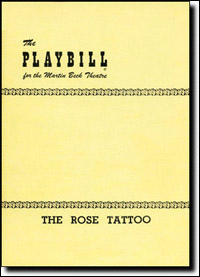 |
|
| Original Broadway Playbill cover in 1951. |
Though, as a play, Rose often takes a back seat to Cat, Menagerie and Streetcar in the estimation of critics, Houdyshell doesn't think Serafina should do the same. "The depth of passion and feeling and love and loss and triumph that that woman goes through is enormous," she asserted. "Her arc and journey are comparable to Blanche and Amanda. In some ways, it's more operatic. She is Italian, after all." "One thing she has in common with a lot of leading ladies in Williams," Houdyshell continued, "is she lives in a society where the extremities of her passions are not necessarily socially acceptable. So her passions are thwarted because of that. She doesn't do well with the repressive society that is the majority. She's an outsider. I think a lot of Williams' women are outsiders in some respect."
| |
 |
|
| Margaret Colin and Derek Cecil in Sweet Bird of Youth at the Williamstown Theatre Festival. | ||
| Photo by Allison Leger |
Like Maggie in Cat, Alexandra Del Lago dominated the first act of the play she inhabits, Sweet Bird of Youth. Originated by Geraldine Page, Alexandra is — like many other Williams ladies — a scrapper and survivor, hanging on to the gauzy beauty of bygone days. In this case, her attachment to fantasy is professional — she's a film actress, one whose prime has passed, but can be seen fleetingly in the face of the hungry and youthful gigolo Chance Wayne.
Ashley called Alexandra her favorite Williams female. "She is an adventuress and the quintessential survivor," she said. "She never lies — by omission or commission — she has no illusions or delusions, except one, and that destroys her life. But she still survives."
Margaret Colin played the role in a 2006 production at the Williamstown Theatre Festival. "I loved her dilemmas," Colin said. "There are shadows of several other Williams women in there. There's a little overlap with Amanda, and echoes of Blanche — the need to see beauty in the world. And the sexuality. She's tragic and sexy and lonely and still holding onto her power and dreams. She demands intimacy from Chance; he's a beautiful loser and she sees people so clearly. She's selfish and then she's capable of enormous gestures. She really tries to help him."
Unlike most of Williams' female characters — but like Tom in Glass Menagerie — Alexandra talks straight to the theatregoer at times. "Those direct-addresses to the audience are just delicious," recalled Colin. "I think it's because she's an actress and she's very comfortable talking to the audience. As a middle-aged actress, it was great getting to say those things: 'I'm not done yet; I didn't do anything wrong; I just got older.'" Read about the 1959 Broadway production of Sweet Bird of Youth in the Playbill Vault, the most comprehensive Broadway database on the internet.
(A version of this feature originally appeared on Playbill.com in April 2012.)










